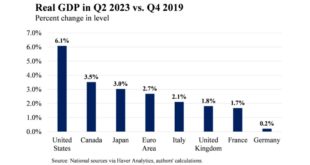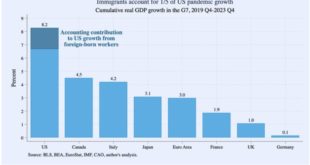Since the beginning of the Covid epidemic, the US economy has performed better than European economies and the Eurozone average. This comparison is useful, and not just for boasting rights. Fiscal policy in the USA and in the Eurozone has been dramatically different – The US Federal Government implemented Six very large fiscal stimuli: The CARES act signed into law by Donald The bipartisan (Manchin) stimulus enacted In December 2024 signed...
Read More »The truth about immigration
The big lie about immigration, promoted by the GOP and its right-wing propaganda outlets, is that under Biden the US has had “open borders.” LOL! Nowhere close. And the US hasn’t had open borders at least since the Chinese Exclusion Act of 1882 that prohibited all immigration of Chinese laborers for ten years. The law remained in force until the passage of the Magnuson Act in 1943.So is immigration good or bad for America? In his new book, “The truth...
Read More »The U.S. Economy Reaches Superstar Status
This article can not get any easier to read and explain how the economy survived a pandemic from 2020 onward and even into 2024. With the right actions by a president and supported by a Congress, the nation survived and it grew. In summation? The “economy has had a remarkable four-year run, judged against both its own history or the international competition.” If you disagree, this one has few technical details to confuse the issues. Make your...
Read More »The (possibly lost) Coronavirus Opportunity — Pablo Pardo
Not specifically about MMT but this: Now, Covid-19 could be a great opportunity for the United States and, also, for the world economy. With interest rates nearing zero, this could be a good opportunity to use fiscal policy to revive the economy. This is something that the defenders of the so-called Modern Monetary Theory, such as the former chief economist of the International Monetary Fund, Olivier Blanchard, and also many banks, have been calling for for years, seeing how their margins...
Read More »America Escalates its “Democratic” Oil War in the Near East — Michael Hudson
The assassination was intended to escalate America’s presence in Iraq to keep control the region’s oil reserves, and to back Saudi Arabia’s Wahabi troops (Isis, Al Quaeda in Iraq, Al Nusra and other divisions of what are actually America’s foreign legion) to support U.S. control o Near Eastern oil as a buttress o the U.S. dollar. That remains the key to understanding this policy, and why it is in the process of escalating, not dying down. I sat in on discussions of this policy as it was...
Read More »Bill Mitchell — US economy continues to grow, albeit at a slower pace—
The US Bureau of Economic Analysis (BEA) released the – Gross Domestic Product, Third Quarter 2019 (Advance Estimate) – data yesterday (October 30, 2019). It shows that the US economy “increased at an annual rate of 1.9 percent in the third quarter of 2019” which was slightly slow than the 2 per cent recorded in the June quarter. As this is only the “Advance estimate” (based on incomplete data) there is every likelihood that the figure will be revised when the “second estimate” is published...
Read More »Economic Policy Institute — Labor Day Series
Economic Policy InstituteBlack workers endure persistent racial disparities in employment outcomesPart of the series Labor Day 2019: How Well Is the American Economy Working for Working People? Summary: Black workers are twice as likely to be unemployed as white workers overall (6.4% vs. 3.1%). Even black workers with a college degree are more likely to be unemployed than similarly educated white workers (3.5% vs. 2.2%). When they are employed, black workers with a college or advanced degree...
Read More »In Conversation with Gabriel Zucman — Heather Boushey with Gabriel Zucman
In this installment, Equitable Growth Executive Director Heather Boushey talks with Gabriel Zucman, professor in the Economics Department at the University of California, Berkeley. His research focuses on global wealth, inequality, and tax havens. Zucman also is co-director of the World Inequality Database, a database aiming at the provision of access to extensive data series on the world distribution of income and wealth. In an in-depth conversation about his research and its implications...
Read More »Joseph P. Joyce — The Change in the U.S. Direct Investment Position
The U.S. has long held an external balance sheet that is comprised of foreign equity assets, mainly in the form of direct investment (DI), and liabilities held abroad primarily in the form of debt, including U.S. Treasury securities. This composition is known “long equity, short debt.” Pierre-Olivier Gourinchas of UC-Berkeley and Hélène Rey of the London Business School claim that this allocation has allowed the U.S. to serve as the “world’s venture capitalist,” issuing short-term debt in...
Read More »The Structural-Demographic Roots of the UK Crisis Peter — Turchin
I am often asked, after my talks or on social media, to pass a judgment on the stability, or lack of it, of a particular country. For example, looking across the Atlantic to the United Kingdom, one sees a lot of parallels with the crisis we are currently living through in the US. The rise of populism, increasing fragmentation of the political landscape—do these similarities reflect deep structural trends below the surface? Such questions can only be answered with a proper...
Read More » Heterodox
Heterodox


